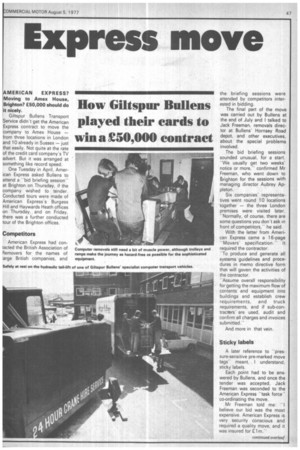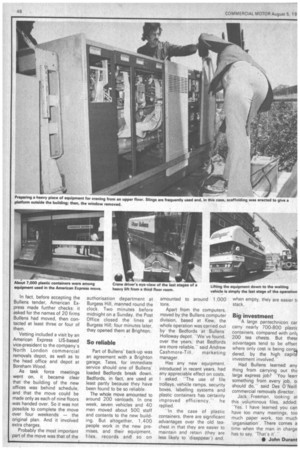Express move
Page 49

Page 50

If you've noticed an error in this article please click here to report it so we can fix it.
How Giltspur Bullens played their cards to win a £50,000 contract
AMERICAN EXPRESS? Moving to Amex House, Brighton? £50,000 should do it nicely.
Giltspur Bullens Transport Service didn't get the American Express contract to move the company to Amex House — from three locations in London and 10 already in Sussex — just that easily. Not quite at the rate of the credit card company's TV advert. But it was arranged at something like record speed.
One Tuesday in April, American Express asked Bullens to attend a -bid briefing session'' at Brighton on Thursday, if the company wished to tender. Conducted tours were made of American Express's Burgess Hill and Haywards Heath offices on Thursday, and on Friday, there was a further conducted tour of the Brighton offices.
Competitors
American Express had contacted the British Association of Removers for the names of arge British companies, and the briefing sessions were attended by competitors interested in bidding.
The final part of the move was carried out by Bullens at the end of July and I talked to Jack Freeman, removals director at Bullens' Hornsey Road depot, and other executives, about the special problems involved.
The bid briefing sessions sounded unusual, for a start. -We usually get two weeks' notice or more,confirmed Mr Freeman, who went down to Irighton for the sessions with managing director Aubrey Appleton.
Six companies' representatives went round 10 locations together — the three London premises were visited later. "Normally, of course, there are some questions you don't ask in front of competitors," he said.
With the letter from American Express came a 16-page -Movers' specification." It required the contractor: -To produce and generate all systems guidelines and procedures in memo directive form that will goven the activities of the contractor.
-Assume overall responsibility for getting the maximum flow of contents and equipment into buildings and establish crew requirements, and truck requirements, and if sub-contracttirsare used, audit and confirm all charges and invoices submitted."
And more in that vein.
Sticky labels A later reference to "pressure-sensitive pre-marked move tagsmeant, I understand, sticky labels.
Each _point had to be answered by Bullens, and once the tender was accepted, Jack Freeman was seconded to the American Express -task force" co-ordinating the move.
Mr Freeman told me: "I believe our bid was the most expensive. American Express is very security conscious and required a quality move; and it was insured for Lim." In fact, before accepting the Bullens tender, American Express made further checks: it asked for the names of 20 firms Bullens had moved, then contacted at least three or four of them.
Vetting included a visit by an American Express US-based vice-president to the company's North London commercial removals depot, as well as to the head office and depot at Boreham Wood.
As task force meetings went on, it became clear that the building of the new offices was behind schedule, and that the move could be made only as each of nine floors was handed over. So it was not possible to complete the move over four weekends — the original plan. And it involved extra charges.
Probably the most important part of the move was that of the authorisation department at Burgess Hill, manned round the clock. Two minutes before midnight on a Sunday, the Post Office closed the lines at Burgess Hill; four minutes later, they opened them at Brighton.
So reliable
Part of Bullens' back-up was an agreement with a Brighton garage, Tates, for immediate service should one of Bullens' loaded Bedfords break down. Bedfords, in fact, are used at least partly because they have been found to be so reliable.
The whole move amounted to around 200 vanloads. In one week, seven vehicles and 40 men moved about 500 staff and contents to the new building. But altogether, 1,400 people work in the new premises, and their equipment, files, records and so on amounted to around 1,000 tons.
Apart from the computers, moved by the Bullens computer division, based at Kew, the whole operation was carried out by the Bedfords at Bullens' Holloway depot. "We've found, over the years, that Bedfords are more reliable," said Andrew Cashmore-Till, marketing manager.
Has any new equipment, introduced in recent years, had any appreciable effect on costs, I asked. "The use of file trolleys, vehicle ramps, security boxes. labelling systems and plastic containers has certainly improved efficiency,he replied.
'In the case of plastic containers, there are significant advantages over the old teachest in that they are easier to maintain and retain (they are less likely to 'disappear') and, when empty, they are easier tc stack
Big investment ""A large pantechnicon car carry nearly 700-800 plastic containers, compared with only 200 tea chests. But thesE advantages tend to be offset where only cost is being con4 dered, by the high capita investment involved.
Had Bullens learned any thing from carrying out thi: large express job? "You learr something from every job, ol should do,said Des O'Neill commercial removals director.
Jack Freeman, looking at this voluminous files, added: 'Yes, I have learned you can have too many meetings, too much paper work, too much 'organisation'. There comes a time when the man in charge has to say, 'That's IC.
• John Durant








































































































